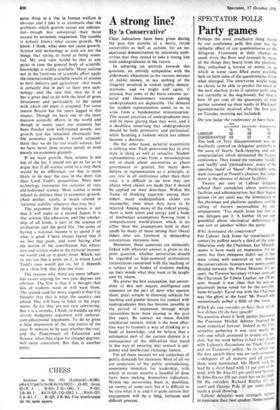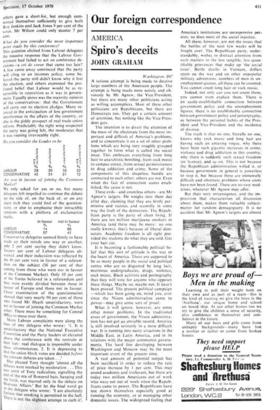SPECTATOR POLLS
Party games
Perhaps the most conclusive thing shown by our conference polls this year was the cathartic effect of our questionnaires on the delegates. Frustrated in their chances to speak from the floor and aroused by many of the things they heard from the platform, they unleashed k torrent of words on us which in some cases filled every available inch on both sides of the questionnaire. From what emerged, The SPECTATOR would make no claims to be able to predict the result of the next election (even if opinion polls were not currently in the dog-house); but here is how 10 per cent of the grassroots of both parties summed up their weeks in Blackpool (questionnaires received after the first post on Tuesday morning not included).
Do you judge the conference to have been
very successful successful disaveoinhog
LABOUR 32 48 16 CONSERVATIVE 23 32 45 The bulk of Tory disappointment was un- doubtedly centred on delegates' antipathy to the aura of hearty back-slapping and sell- congratulation which permeated the Victory conference. They found the motions 'woolly' and `waffly' and 'platitudinous', many of the speeches 'tepid' or 'bland'. Predictably some were outraged at Powell's absence. but rather more at the absence of decent facilities.
Twenty per cent of Labour delegates echoed their complaints about conference facilities and administration, but their biggest grouse (34 per cent) was the domination of the chairman and platform speakers, and the calling of known personalities by pre- arrangement. 'Too much from too few' as one delegate put it. A further 16 per cent grumbled about ideological deficiencies of one sort or another within the party.
Who dominated the conference?
For Labour, Jack Jones far outstripped all- corners by polling nearly a third of the votes. Otherwise only the Chairman. Ian Mikardo. seems to have made an impression (14 per cent), but then delegates didn't say if they were voting with approval or not. Among the conservatives. honours were pretty evenly divided between the Prime Minister (17 per cent). the Foreign Secretary (14 per cent) and the Chairman Sir Edwin Leather. MP (20 per cent, though it was clear that he was un- graciously being voted for by the anti-plat- form brigade). Equal top with the Chairman was 'the ghost at the feast' Mr Powell who mysteriously polled a fifth of the votes.
Which do you consider to have been (a) the best debate (h) the best speech?
No question about it, both parties discovered the Common Market debates inspired the most oratorical fervour. Indeed at the Con- servative gathering it was very nearly the only one which anneared to arouse any pas- sion; but the week before it had vied closely with Labour's discussions on Trade Unions and on Economic policy. As to which was the best speech there was no such consensus —delegates of all statures and all persua- sions were nominated. Mr Heath took the lead by a short head with 13 per cent of the total, with Sir Alec (11 per cent) and Norman St John-Stevas (10 per cent) hot on his heels. Of the outsiders Richard Ritchie (11 per cent) and George Pole (6 per cent) clearly made a good showing.
Labour delegates were strangely reticent to nominate their best speaker. Some refused,
others gave a short-list, but enough com- mitted themselves sufficiently to give both Roy Jenkins and Jack Jones 9 per cent of the votes. Mr Wilson could only muster 7 per cent.
What do you consider the most important point made by this conference?
This question elicited from Labour delegates the massive response that the Labour Gov- ernment had failed to act on conference de- cisions—a cri de coeur that came too late? A few came away convinced that the party will cling to an incomes policy, some be- lieved the party still didn't know why it lost the election, and others expressed the pro- found belief that Labour would be as re- sponsible in opposition as it was in govern- ment. Equally pious was the majority opinion of the conservatives: that the Government will carry out its election pledges. Many re- joiced in the anticipation of less government interference in the affairs of the country. or else in the giddy prospect of real trade union reform. Predictably the right wing suspected the party was going left, the moderates that it was veering irrevocably right.
Do you consider the Leader to be Are you in favour of joining the Common Market?
We only asked for yes or no, but many delegates felt impelled to continue the debate up the side of, on the back of, or on any spare inch they could find of the question- naire. or else to emphasise their intractible opinions with a plethora of exclamation marks.
in favour not in favour LABOUR 14 66
CONSERVATIVE 57 41 Conservative delegates seemed firmly to have made up their minds one way or another. only 2 per cent saying they didn't know. Twenty per cent of Labour delegates ab- stained, and their indecision was reflected by the 40 per cent vote in favour of a referen- dum on the subject (36 per cent of that coming from those who were not in favour of the Common Market). Only 10 per cent of the Tories believed in a referendum and they were evenly divided between those in favour of Europe-and those not in favour. Closer examination of the questionnaires showed that very nearly 90 per cent of those who found Mr Heath unsatisfactory, were not in favour of joining the Common Market either. There must be something for Central Office to muse over there.
Many Labour complaints were along the lines of one delegate who wrote: '1. It is unsatisfactory that the -National Executive Committee and the Party leaders sit elevated above the conference with the rostrum at their feet: real dialogue is impossible under these circumstances. 2. It is depressing to find the union block votes are decided before the relevant debates are taken ...'
One pleased Tory thought 'almost all the
debates were marked by moderation This new spirit of Tory radicalism, signalling the end of the era of flowered hats, hanging and the birch, was marred only in the debate on Overseas Affairs! But let the final word go to the delegate who wrote: 'I am absolutely furious that smoking is permitted in the hall. There is not the.slightest attempt to curb it'. t t. C"', 11 43 i ._ il i ;I g''',1 -CI s,
% % LABOUR 28 30
CONSERVATIVE 43 24
16 21 0
t.11, ova
22 12







































 Previous page
Previous page